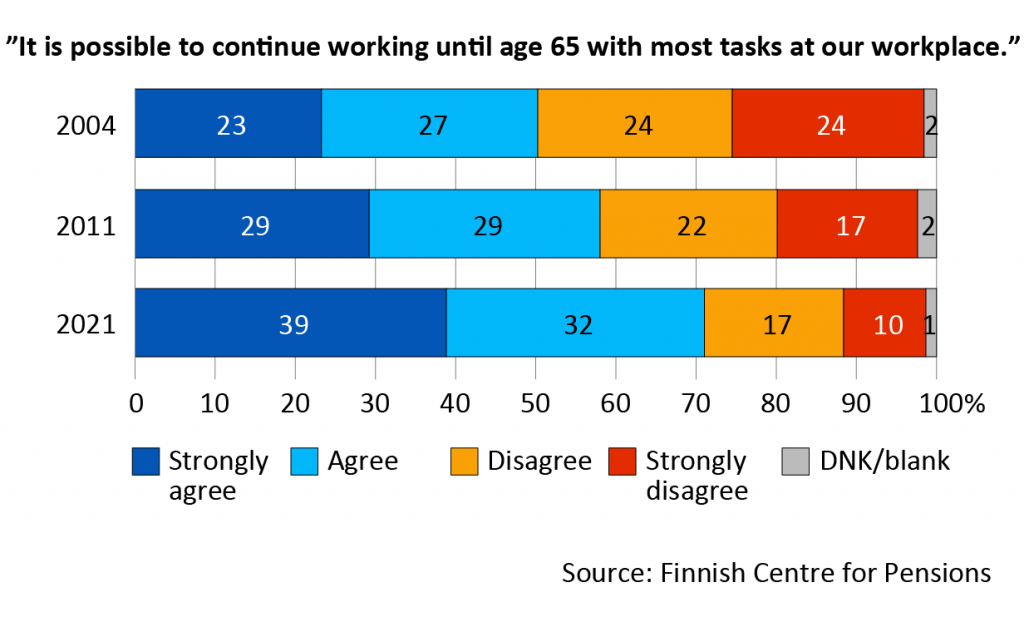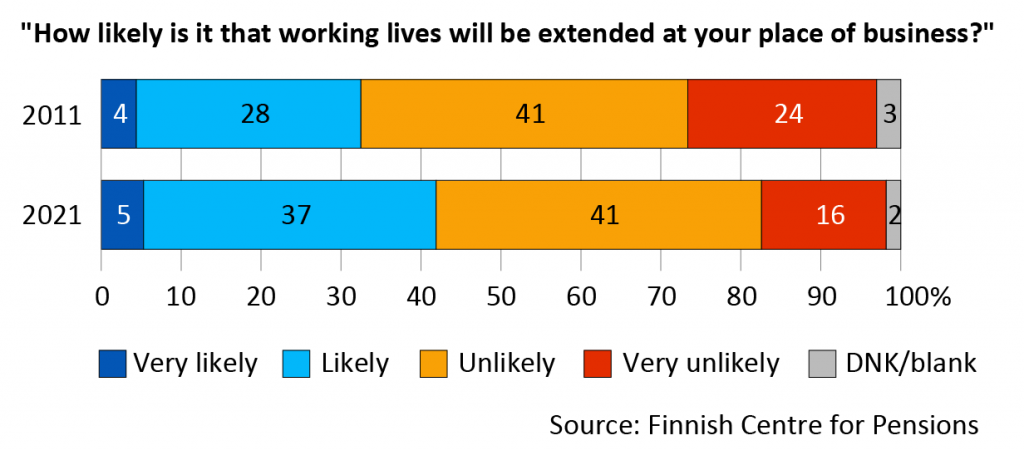Employers more favourable than before to older workers – most employers doubt that working lives will be extended at their own place of business

Nearly three out of four employers state that working with typical tasks at the workplace until age 65 is possible. Yet, according to a new study by the Finnish Centre for Pensions, most employers doubt that working lives will be extended at their own place of business.
Employers’ attitudes towards older workers has become increasingly positive. More than 70 per cent of the employers agree that workers can do typical tasks at the workplace until age 65. In the early 2000s, the equivalent percentage was around 50.
Senior researcher Noora Järnefelt (Finnish Centre for Pensions) finds employers’ change of attitude to be significant. There are several reasons for the change. One of them is the retirement age.
“Overall, employers’ views on the appropriate age at which to retire on an old-age pension seems to be in line with the rising statutory retirement age. In 2021, age 65 is considered a suitable age to retire; in 2004, it was 62 years.”
The ageing population is another factor affecting employers’ attitudes.
“In 2000, around 250,000 workers in Finland were older than 55 years. Twenty years later, they number nearly 600,000.”
According to Järnefelt, the previous comprehensive early retirement scheme also influenced people’s notions of the suitable age at which to exit working life.

Great differences between industries
More than 80 per cent of the employers within the information, communications and business service industries agree or strongly agree that people can continue working with typical tasks at their workplace until age 65.
The largest change of attitude has taken place in the social and health care industries. In 2011, only 41 per cent of social and health care employers felt that their employees could continue working until age 65. In 2021, the equivalent percentage is 75.
Yet, around one third of the employers find age 65 to be too high.
“In construction, for example, only an ample 40 per cent of the employers agree that their workers can continue at work until age 65. There is no major change of attitude in this question compared to 2011,” Järnefelt explains.
Most employers doubt that working lives will be extended at their own workplace
Extending working lives has been a long-standing key objective of Finnish pension and economic policy. Most employers agree with this objective. A recent study by the Finnish Centre for Pensions shows that nearly two out of three employers feel that extending working lives is an important objective for society.
However, the majority doubt that the aim will be reached. Up to 57 per cent of the employers find it unlikely or very unlikely that working lives will be extended at their own place of business.

“It’s surprising that employers doubt that working lives will be extended since the retirement ages are rising and wage earners intend to retire at an increasingly higher age. At the same time, statistics shows that rising retirement ages have largely resulted in extended working lives and increasing working in retirement,” Järnefelt points out.
Growing interest in employing older workers
Employers’ willingness to employ older workers is at a good level. The study by the Finnish Centre for Pensions shows that nearly 80 per cent of the employers feel that they could hire over-55-year-olds as new employees.
The interest to hire older workers is weaker in the private than in the public sector.
The study was planned by the Finnish Centre for Pensions and carried out by Statistics Finland in the spring of 2021. The sample of the survey included 2,500 private and public sector workplaces. The response rate was 66 per cent.
Research publication in Julkari
